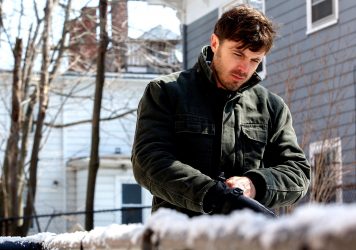Nazi occupation in the French countryside leads to forbidden love in this so-so literary adaptation.
Nazis, eh? You can’t live with ’em… British director Saul Dibb appears to have severed all ties with the urban, contemporary fiction of his formative years (cf Bullet Boy) in a bid to position himself as modern cinema’s one-stop replacement for Merchant-Ivory. The problem with this equation is that Merchant-Ivory often brought passion, verve and a measure of originality to their singular brand of literary prestige extravaganza, where on the evidence of the underpowered Suite Française, Dibb still has some way yet to go.
Which is a shame, as the source material is as juicy and entrenched in romantic lore as they come. It’s an adaptation of a series of stories by one Irène Némirovsky who died in Auschwitz before her manuscripts were completed (rough plot outlines remained) and, subsequently, they became lost artefacts. The notebooks resurfaced in 1998, and the resulting salvaged novel swiftly took its place among the annals of modern greats.
Dibb’s film centres on transitional activities in the town of Bussy circa 1940 as German troops rolled their tanks into France as part and parcel of occupation duties. Well-to-do, hard-nosed dowager, Madame Angellier (Kristin Scott-Thomas, who else?) and her mousy, musically-inclined daughter-in-law, Lucille (Michelle Williams), do their best to muddle on as the Madame’s son (and Lucille’s husband), Gaston, is out fighting for his country.
Trouble is most definitely a-brewing, and that’s when the Sunday worship is interrupted by the sound of stomping jackboots. The next thing the pair know, they’ve been saddled with dashing, immaculately-coiffed Nazi lieutenant, Bruno (Matthias Schoenaerts), as an enforced houseguest. Yet Bruno turns out to be a self-loathing Nazi, a gentleman, a paragon of decency. He’s also quite handy on the ivories.
This variety of benign Nazi comes from a rich cinematic lineage, stretching back to Jean-Pierre Melville’s Le Silence de la Mer via Steven Spielberg’s Schindler’s List, both films exploring the notion of how a national political creed can interrupt a person’s basic sense of right and wrong. Suite Française touches, very gently, on that concept, but its maudlin theatrics, single-serving supporting characters and handily sign-posted plot progressions means that it doesn’t come close to emulating the hair-trigger tension of the former and the fulsome and intricate melodrama of the latter.
Dibb clearly knows what he’s dealing with in this material, but is too beholden to unnecessary pithiness and blunt dialogue exchanges which sees characters appear to be talking directly to an audience rather than one another. No nuance is left to chance, no moment considered worthy of a treatment which might result in even mild ambiguity. There’s a single Jewish character in the film who feels like she’s been wheeled in as a sacrificial lamb, while Margot Robbie’s frumped-up farm hand seems to have no place in the story at all.
Perhaps the film’s greatest failing, however, is that it could perhaps be accused of seriously underselling the horrors of the German occupation. The Nazi characters come across as so standardised and archetypal, their actions so boorish and obvious, more like action movie henchmen than real people, that you’d have to be descending in and out of a narcoleptic torpor not to guess exactly how thing plays out.
Published 12 Mar 2015
Saul Dibb returns after 2008's decent Keira Knightley vehicle, The Duchess.
Trashier than perhaps it thinks it is.
Everyone involved has been better elsewhere.

By Dan Einav
She’s adapting Elizabeth Jane Howard’s romantic drama novel.

Casey Affleck delivers a career-best performance in Kenneth Lonergan’s stunning meditation on loss.

By Lena Hanafy
Matthias Schoenaerts and Bruno Ganz are among the cast of the director’s upcoming film Radegund.